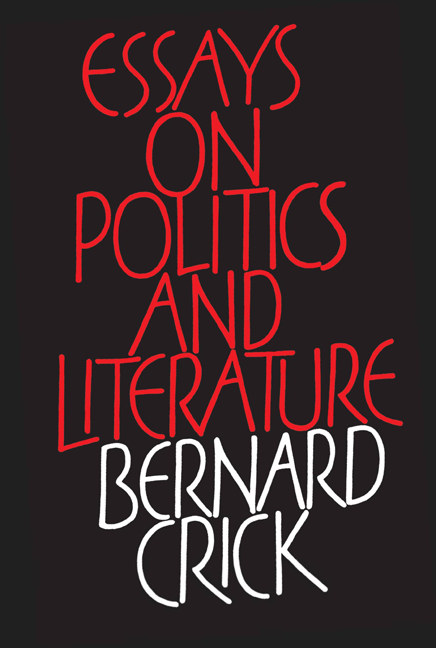Book contents
- Frontmatter
- Contents
- Preface
- Acknowledgements
- Foreword by David Daiches
- One Literature and Politics
- Two The Political in Britain’s Two National Theatres
- Three Young Writers of the Thirties
- Four Koestler’s Koestler
- Five Hannah Arendt: Hedgehog or Fox?
- Six Beatrice Webb as English Diarist
- Seven Words
- Eight My Lse
- Nine Reading The Observer as a Complex Text
- Ten On the Difficulties of Writing Biography and of Orwell’s in Particular
- Eleven Reading Nineteen Eighty-Four As Satire
- Twelve Animal Farm For Schools
- Thirteen Orwell and English Socialism
- Fourteen On the Orwell Trail
- Fifteen Wedekind’s Spring Awakening
- Sixteen Horvath’s Tales From the Vienna Woods
- Seventeen Pinter’s No Man's Land
- Eighteen Polly By Gaslight
- Nineteen Edgar Catches Jenkins’ Ear at the Barbican
- Twenty Barrault at the Barbican
- Index
Four - Koestler’s Koestler
Published online by Cambridge University Press: 24 September 2020
- Frontmatter
- Contents
- Preface
- Acknowledgements
- Foreword by David Daiches
- One Literature and Politics
- Two The Political in Britain’s Two National Theatres
- Three Young Writers of the Thirties
- Four Koestler’s Koestler
- Five Hannah Arendt: Hedgehog or Fox?
- Six Beatrice Webb as English Diarist
- Seven Words
- Eight My Lse
- Nine Reading The Observer as a Complex Text
- Ten On the Difficulties of Writing Biography and of Orwell’s in Particular
- Eleven Reading Nineteen Eighty-Four As Satire
- Twelve Animal Farm For Schools
- Thirteen Orwell and English Socialism
- Fourteen On the Orwell Trail
- Fifteen Wedekind’s Spring Awakening
- Sixteen Horvath’s Tales From the Vienna Woods
- Seventeen Pinter’s No Man's Land
- Eighteen Polly By Gaslight
- Nineteen Edgar Catches Jenkins’ Ear at the Barbican
- Twenty Barrault at the Barbican
- Index
Summary
In 1942 George Orwell wrote about a new breed of writers who were specifically political writers’, men whose best writing was to be found in that aesthetically unfavoured subject matter. Among them he numbered Malraux, Borkenau, Silone, and his new friend Arthur Koestler.
Koestler has been almost as difficult to come to terms with as Orwell, even though, born only two years later, in 1905, he is still very much alive and has written copiously about himself and his ‘career’—he is fond of the word career. Admiration for both men is tinged with uncertainty as to quite what we are admiring; and some, whose wounds still ache from old cuts inflicted by one or the other of them, would deny their merit as writers at all, or call it grossly inflated. Part of the difficulty of appraising Koestler is that he has written so much and in a variety of forms on widely varying subjects, most of which stir strong reactions. A bibliography lists thirty published books.
Now Koestler seems to help us by providing a selection of his own writings. What is it in fact? ‘An omnibus,’ he says, which the Concise Oxford tells him ‘is a volume containing several stories, plays, etc., by an author published at a low price to be within the reach of all.’ That it is, a fine piece of publishing, incidentally, but in one respect it is a curious omnibus, for it is not ‘the best of Koestler,’ a selection of works as a whole, but rather heavily edited abridgements from all the thirty books. He has had to reduce 9000 pages to 700, so to seven and a half per cent of the total, he tells us with mock pedantry, obviously and understandably pleased with his own professional skill with the knife, even on himself.
This book must at least be his own view of his achievement, especially as at first glance it includes something of everything: Zionist, Communist, Anticommunist, philosopher, scientist, pamphleteer, deep pessimist, profound optimist, unsatisfied Yogi and frustrated commissar. Can we now judge whether he is a bourgeois hedgehog or a natural aristocrat of foxes?
- Type
- Chapter
- Information
- Essays on Politics and Literature , pp. 62 - 71Publisher: Edinburgh University PressPrint publication year: 2020

